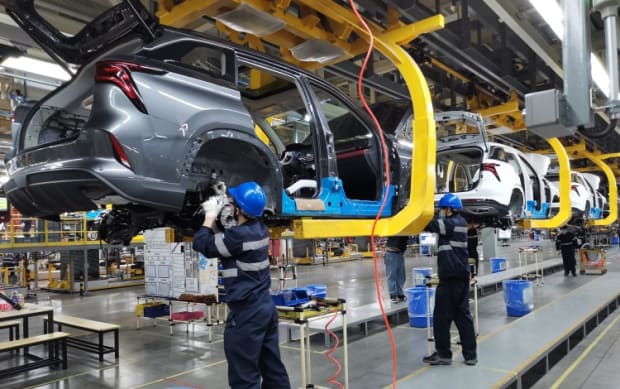In the wake of the 1970s oil crises, the U.S. established the Strategic Petroleum Reserve, making it official U.S. policy to stockpile billion of barrels of petroleum to end reliance on foreign producers for the literal gas that ran America's engine.
Fast forward 50 years, and that "gas" is now semiconductors.
While you still need to fill up your car and in some cases heat your home with oil, the vast majority of manufactured goods -- from cars and trucks to iPhones to refrigerators to video games and kids' toys -- function using tiny little computer chips.
And the supply of those tiny little computer chips has never been tighter, according to the U.S. Commerce Department.
The median supply of chips held by manufacturers has dropped from 40 days' worth in 2019 to less than five days' worth last year, according to the eye-popping request for information report released Tuesday, with inventories even smaller in "key industries."
"The semiconductor supply chain remains fragile," the report said. "Demand continues to far outstrip supply."
TheStreet Recommends: Why Batteries Are a Linchpin In the Energy Transition
That limited supply means that disruptions to production overseas -- such as those from weather or new Covid-19 outbreaks -- could again lead to factory shutdowns and furloughed workers in the U.S., according to the report, which also noted that respondents “…did not see the problem going away in the next six months."

More Pain on the Way for Consumers
A global supply crunch sparked by the pandemic, extreme weather and supply chain issues has led to shortages and, in some cases, higher prices of cars, iPhones, washing machines, kids' toys and more — at a time when consumers have never been more reliant on tech devices.
The Commerce Department report identified certain semiconductor products for which the supply challenges are most acute, including "legacy logic chips" which are used in cars, medical devices and other products, and "analog chips" used in image sensors.
TheStreet Recommends: Why Investors Should Care About the Resource Transition
"We aren’t even close to being out of the woods as it relates to the supply problems with semiconductors," Commerce Department Secretary Gina Raimondo said. "The semiconductor supply chain is very fragile, and it is going to remain that way until we can increase chip production."
Related: Intel Off the Hook After EU Court Overturns $1.2 Billion Fine
Last year, General Motors (GM) was forced to temporarily shutter production at most of its North American plants because of the chip shortage, and many other automakers slashed their production plans.
The Biden administration has been working to prop up the US chip-making industry, both to ease current supply chain woes and reduce America's dependence on foreign production of the crucial components going forward.
The biggest bottleneck in the chip supply chain is capacity at semiconductor fabrication plants, called "fabs.” Still, some chipmakers are already looking to turn the tide.
A Strategic Chip Reserve?
Several chip makers have announced plans to invest billions of dollars in new plants. Just last week, Intel (INTC) announced plans to invest another $20 billion to build a chip manufacturing complex outside Columbus, Ohio. Samsung (SSNLF) , meantime, is set to build a semiconductor plant in Taylor, Texas.
Congress has passed the CHIPS for America Act, which includes $52 billion in subsidies to support domestic semiconductor manufacturing but has not yet allocated the funds.
To be sure, one high-profile company isn't being stopped in its tracks by the ongoing chip shortage.
Tesla (TSLA Get Tesla Inc Report delivered a record 308,000 vehicles in the fourth quarter, a record for the electric vehicle (EV) company, with most of those deliveries being 3 and Y models stacked to the brim with chips.
Tesla's ability to design parts and components in-house and also adapt parts and even switch to newly available parts has helped it navigate the chip crisis.
A better view of just how well will emerge after the bell on Wednesday when the electric car maker releases its fourth-quarter results.
Jim Cramer: Why the Chip Shortage is a Matter of National Defense







